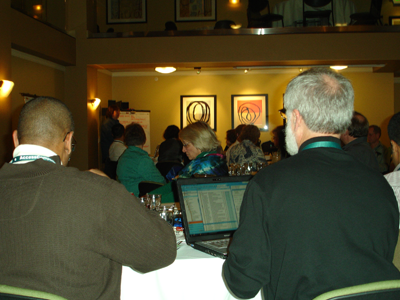About the CBI (Access to Computing in Higher Education 2009)

The Access to Computing in Higher Education Capacity-Building Institute took place April 21 - 24, 2009, in Seattle, WA. Its overall purpose was to explore ways to increase the participation and success of students with disabilities in computing and IT postsecondary studies and careers.
Participants in this two-and-one-half-day event included student service leaders, administrators, and teaching faculty from institutions around the county. Hosted by the University of Washington (UW), the CBI provided a forum for comparing recruitment and access challenges, sharing successful practices, developing collaborations, and otherwise increasing the capacity of institutions to serve students with disabilities in computing and IT fields. Specific goals of this CBI were to:
- bring together campus and community members who represent students with disabilities, faculty and administrators in IT and computing, and programs that serve to broaden participation in computing and IT fields
- share best practices and develop new practices that will increase the number and success of students with disabilities in computing and IT fields
- learn about accessibility, universal design, and funding opportunities to increase the participation of students with disabilities in computing and IT fields
- network with colleagues from around the country
Speakers and panelists were also CBI participants and shared their expertise on a variety of topics related to computing, IT, and student success. Broad issues that were discussed included:
- access to higher education curricula and courses through universal design of education and accommodations
- best practices for outreach to veterans with disabilities in higher education
- strategies to develop effective partnerships between disabled student services offices, computing departments, veterans organizations, and other campus services
- increasing access to computing and IT through assistive technology
- developing accessible computing and IT curricula
- assisting students with disabilities in their transitions to computing and IT graduate education and careers
In this CBI:
- All participants contributed to its success.
- Experts in all topic areas were in the audience.
- Although some of the CBI content was predetermined, discussions and presentation content changed as the meeting unfolded and participant interests were expressed.
The CBI was comprised of panel and individual presentations and working group discussions. Panel discussions and individual presentations offered participants opportunities to discover ways to make computing and IT programs welcoming and accessible for students with disabilities. Working group discussions allowed participants time to gather in small groups and explore answers to the following questions:
- What are the barriers and challenges that students with disabilities face in pursuing computing undergraduate and graduate academic programs and careers?
- How can disability support services, computing departments, veterans organizations, and other groups work together effectively to increase the number of people with disabilities in the computing sciences?
- How can disability-related topics be integrated into the computing and IT classroom curriculum on your campus?
- What specifically can your computing department, disability support services office, veterans organization, or other campus service do to improve the recruitment and support of students with disabilities in computing and IT departments and careers?